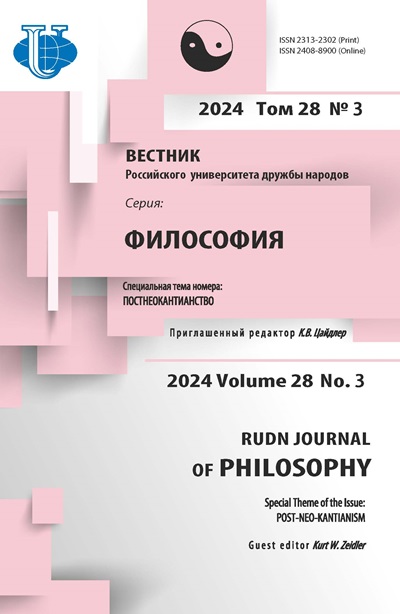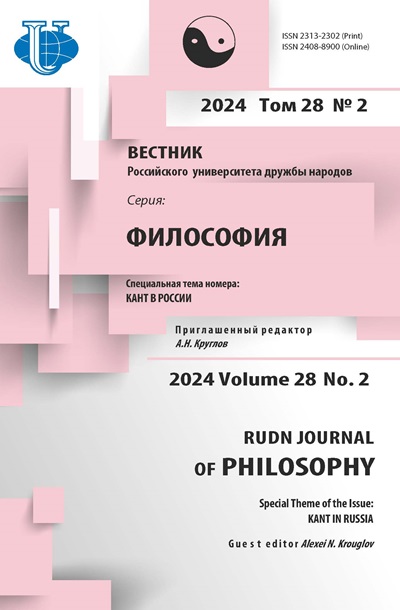The Theme of Suffering in the Work of M. Foucault
- Authors: Popov E.A.1
-
Affiliations:
- Altai State University
- Issue: Vol 28, No 2 (2024): KANT IN RUSSIA
- Pages: 434-449
- Section: HISTORY OF PHILOSOPHY
- URL: https://journals.rudn.ru/philosophy/article/view/39817
- DOI: https://doi.org/10.22363/2313-2302-2024-28-2-434-449
- EDN: https://elibrary.ru/VFAQYL
Cite item
Full Text
Abstract
The article reveals the foundations of the theme of suffering in M. Foucault's concept. This topic unfolds at the level of Foucault’s discursive analysis and references to the concept of biopolitics. Knowledge becomes the unifying link for such contradictory phenomena. At the same time, the key thesis in the thinker’s approach is as follows: any knowledge about the world and a person’s place in it is transmitted through symbolic exchange, affects the subject's attitude to the surrounding reality. Suffering appears as a result of the rupture of symbolic exchange under the influence of biopolitics. The gap releases sacred knowledge about the world based on the value-semantic structures of human individual and collective existence. Biopolitics and government aim to gain access to this knowledge. The article examines this approach and evaluates the tools of biopolitics’ impact on the individual in comparison with the psychiatric power that complements such influence. Foucault traces the history of insanity to substantiate the idea of increasing suffering of subjects, extrapolates this idea to the modern social world to demonstrate its socio-political and socio-economic vulnerability. The article shows what grounds Foucault offers for conceptualizing suffering in the context of the powerful influence of biopolitics on a social subject. It is revealed that the government, according to Foucault’s approach, launches the flywheel of biopolitics, which sets, among other things, the goal of seizing this knowledge. A continuation of biopolitics is the psychiatric power, which is also interested in obtaining knowledge.
Keywords
About the authors
Evgeniy A. Popov
Altai State University
Author for correspondence.
Email: popov.eug@yandex.ru
ORCID iD: 0000-0003-3324-8101
DSc in Philosophy, Professor, Professor, Department of Sociology and Conflictology
66 Dimitrova St., Barnaul, 656049, Russian FederationReferences
- Shevchenko OK. Discourse "Pax Yalta" (on the question of the spatial-temporal model of M. Foucault's power). Voprosy filosofii. 2022;(11):122-129. (In Russian). https://doi.org/10.21146/0042-8744-2022-11-122-129
- Foucault M. The History of madness in the Classical era. Saint Petersburg: University Book publ.; 1997. (In Russian).
- Foucault M. Psychiatric Power: A course of lectures delivered at the Collège de France in the 1973-1974 academic year. Saint Petersburg: Nauka publ.; 2007. (In Russian).
- Bang HP. Foucault’s Political Challenge: From Hegemony to Truth. N.Y.: Palgrave Macmillan; 2015.
- Foucault M. The Birth of the clinic. Moscow: Sense publ.; 1998. (In Russian).
- Foucault M. The birth of social medicine. In: Intellectuals and power: Elected political Art., protrusion. and interview. Pt. 3. Moscow: Praxis publ.; 2006. P. 79-95. (In Russian).
- Deleuze Zh. Foucault. Moscow: Publishing House of Humanitarian Literature; 1988. (In Russian).
- Foucault M. Politics, philosophy, culture. Interviews and other writings 1977-1984. Kritzman L, editor. New York: Routledge; 1988.
- Cohen C, Timimi S, editors. Liberatory psychiatry. Cambridge: Cambridge University Press; 2008.
- Foucault M. Madness and society. In: Intellectuals and power: Elected political Art., protrusion. and interview. Pt 1. Moscow: Praxis publ.; 2002. P. 7-18. (In Russian).
- Foucault M. The birth of biopolitics. A course of lectures delivered at the Collège de France in the 1978-1979 academic year. Saint Petersburg: Nauka publ.; 2010. (In Russian).
- Foucault M. The Will to Truth: Beyond Knowledge, power and sexuality. Works of different years. Moscow: Castal publ.; 1996. (In Russian).
- Foucault M. Hermeneutics of the subject: A course of lectures delivered at the Collège de France 1981-1982 academic year. Saint Petersburg: Nauka publ.; 2007. (In Russian).
- Foucault M. Truth and legal institutions. In: Intellectuals and power: Elected political Art., protrusion. and interview. Pt. 2. Moscow: Praxis publ.; 2005. P. 40-177. (In Russian).
- Foucault M. Power, the magnificent beast. In: Intellectuals and power: Elected political Art., protrusion. and interview. Part 3. Moscow: Praxis publ.; 2006. P. 7-26. (In Russian).
- Dyakov AV. Michel Foucault and his time. Saint Petersburg: Aleteya publ.; 2010. (In Russian).
- Michel D. Michel Foucault and Western medicine. Logos. 2019;29(2):64-81. (In Russian). https://doi.org/10.22394/0869-5377-2019-2-64-78
- Bracken Р, Thomas Р. From Szasz to Foucault: On the Role of Critical Psychiatry. Philosophy, Psychiatry & Psychology. 2010;17(3):219-228.
- Foucault M. Polemics, politics and problematization. In: Intellectuals and power: Elected political Art., protrusion. and interview. Pt. 3. Moscow: Praxis publ.; 2006. P. 55-65. (In Russian).
- Double DB, editor. Critical psychiatry: The limits of madness. London: Palgrave Macmillan; 2006.
- Miller P. Critiques of psychiatry and critical sociologies of madness. In: The power of psychiatry. Miller P, Rose N, editors. Cambridge: Polity Press; 1986.
- Rose N. The psychological complex: psychology, politics and society in England 1869-1939. London: Routledge and Kegan Paul; 1985.
- Vlasova OA. Phenomenological psychiatry and existential analysis: History, thinkers, problems. Moscow: Publishing House "Territory of the Future"; 2010. (In Russian).
- Gadzhikurbanova PA. “Spiritual exercises” or “self-care” (stoic ethics in the interpretation of P. Ado and M. Foucault). Eticheskaya mysl’. 2009;(9):27-42. (In Russian).
- Oksala J. Foucault on Freedom. Cambridge: Cambridge University Press; 2005.
- Tirkkonen S. Experience in Michel Foucault’s Philosophy. Helsinki: University of Helsinki; 2018.
- Chan G, Brykczynski K, Malone R, Benner P, editors. Interpretive Phenomenology in Health Care Research. Indianapolis, IA: Sigma Theta Tau International; 2010.
- Kant I. Experience about diseases of the head. In: Works in 8 vols. Vol. 2. Moscow: CHORO Publishing House; 1994. P. 143-158. (In Russian).
- Lynch RA. Foucault’s Critical Ethics. New York: Fordham University Press; 2016.
- Garlick S. The Beauty of Friendship: Foucault, Masculinity and the Work of Art. Philosophy & Social Criticism. 2002;(28):558-577.
- O’Leary T. Foucault and The Art of Ethics. London & New York: Continuum; 2002.
- Downing L. The Cambridge Introduction to Michel Foucault. Cambridge: Cambridge University Press; 2008.
















